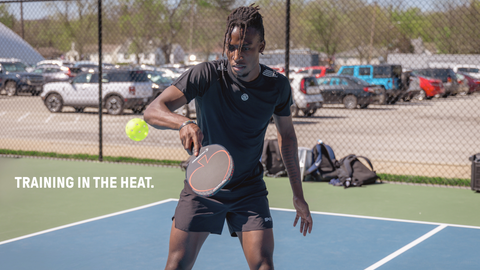Basketball is more than just physical skill and athleticism—mental toughness plays a key role in a player’s performance, especially when the game is on the line. Whether you’re making a game-winning free throw, executing a crucial defensive stand, or leading your team in a high-stakes moment, how you manage pressure can define your success. Developing the mental resilience to stay focused and composed is essential. Here's how to strengthen your mental game and perform under pressure.
1. Embrace the Pressure
Pressure is inevitable in competitive sports, but it doesn’t have to be intimidating. Mentally tough players know that pressure can be a catalyst for peak performance. Instead of letting nerves take over, reframe pressure as an opportunity to shine. Remind yourself that feeling nervous is natural and can even enhance focus if harnessed correctly.
Tip: When the game gets intense, focus on the basics. Concentrate on one play at a time and trust the work you've put in during practice. By breaking the game down into manageable steps, you can stay in control of your emotions and your performance.
2. Visualize Success
Visualization is a mental technique that many elite athletes swear by. By imagining successful outcomes—whether it’s sinking a three-pointer, making the perfect pass, or executing a defensive stop—you mentally rehearse for game-time situations. Visualization builds confidence, reduces anxiety, and prepares your mind to stay calm in key moments.
Tip: Take time before games to close your eyes and run through specific scenarios where you excel. Visualize not just the action, but also the emotions you’ll feel, the environment around you, and the satisfaction of executing your role perfectly. Over time, this practice becomes a powerful tool to reduce in-game pressure.
3. Control What You Can Control
In high-pressure situations, it’s easy to become distracted by external factors—opponents, the crowd, or even the score. Mentally tough players stay grounded by focusing on what they can control: their attitude, effort, and decision-making. By concentrating on your own actions, you block out distractions and reduce anxiety.
Tip: Develop a short mental checklist to keep yourself grounded in tough situations. Ask yourself: Am I in the right position? Am I communicating with my teammates? Am I focused on my assignment? This self-awareness can help you stay locked in and maintain your composure.
4. Develop a Routine
Creating consistent pre-game or in-game routines can help regulate emotions during high-stakes moments. Whether it’s a breathing technique, a mantra, or a physical routine like bouncing the ball a certain way before free throws, routines help players stay focused and calm. They anchor you to familiar actions, which can be soothing when the pressure rises.
Tip: Experiment with different routines that help you feel calm and centered. Some players use deep breathing exercises to relax before taking a shot, while others might recite a mantra that reinforces confidence. Find what works for you and incorporate it into your game preparation.
5. Learn from Failure
Even the best players miss shots, make mistakes, or lose games. Mental toughness isn’t about perfection, it’s about resilience. The ability to bounce back from setbacks is critical. Instead of dwelling on mistakes, focus on what you can learn and how you can improve for the next play or game.
Tip: After a tough game, reflect on what went well and what you can improve, but avoid beating yourself up over errors. Mental toughness comes from accepting mistakes as part of the game and using them as fuel for growth.
6. Stay Present
In high-pressure moments, it’s easy to get caught up in thinking about past mistakes or worrying about future outcomes. The key to staying mentally tough is to stay present—focused entirely on the current play, the current possession, the current second. By staying in the moment, you allow yourself to react instinctively and confidently, without the burden of overthinking.
Tip: Practice mindfulness during training and games. When you find your mind wandering, gently bring your focus back to the task at hand. This simple act of refocusing helps build mental clarity and reduces the overwhelm that pressure often brings.
Conclusion
Mental toughness is the edge that sets great players apart from good ones. By embracing pressure, visualizing success, focusing on controllable factors, establishing routines, learning from mistakes, and staying present, you can build the resilience needed to excel on the court. Just like your physical skills, mental toughness requires practice—but once developed, it becomes one of the most powerful tools in your basketball arsenal.






